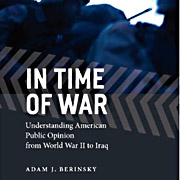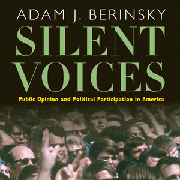Adam Berinsky wins 2011 Levitan Prize in the Humanities

By examining the fundamental problem of democratic citizenship—
namely the enduring obstacle of political misinformation—Berinsky's
new project will have important implications for the conduct of
21st century politics.
Innovative and creative scholarship
Deborah K. Fitzgerald, Kenan Sahin Dean of the School of Humanities, Arts and Social Sciences, is delighted to announce that the James A. (1945) and Ruth Levitan Prize in the Humanities has been awarded to Adam Berinsky, Associate Professor of Political Science. The $25,000 prize is awarded annually as a research fund to support innovative and creative scholarship in the humanities by faculty members in MIT's School of Humanities, Arts and Social Sciences.
Of the award, Rick Locke, Class of 1922 Professor of Political Science and Management, and Head of the MIT Department of Political Science, writes, "This is a wonderful and well-deserved recognition of Adam Berinsky's cutting-edge research and teaching on public opinion and survey research."
Berinsky's research focus
Berinsky is a specialist in the fields of political behavior and public opinion. His previous work has explored the relationship between the mass public and politicians from a variety of perspectives. His current work concerns the study of political rumors and misinformation. Rumors and innuendo have long influenced the conduct of politics. With the rise of the 24-hour news cycle and the rapid communication of specialized information via the internet, however, the potential for the spread of false information through rumors is perhaps greater than at any time in history.
Supported by the Levintan prize, Berinsky’s new project will explore the causes and consequences of political rumors—and what can be done to stop their spread. By examining the fundamental problem of democratic citizenship—namely the enduring obstacle of political misinformation—this project will advance the study of mass political behavior in new ways and will have important implications for the conduct of politics in the 21st century.
Publications
Berinsky, who received his PhD from the University of Michigan in 2000, serves as the director of PERL, the MIT Political Experiments Research Lab. He is the recipient of grants from the National Science Foundation and was a fellow at the Center for Advanced Study in the Behavioral Sciences.
Berinsky's books include In Time of War: Understanding American Public Opinion from World War II to Iraq (University of Chicago Press, 2009), and Silent Voices: Public Opinion and Political Participation in America (Princeton University Press, 2004). He has also published numerous articles in such publications as The American Journal of Political Science, The Journal of Politics, Political Behavior, Political Psychology, Public Opinion Quarterly, The Quarterly Journal of Political Science, American Politics Research, and Communist and Post-Communist Studies.
About In Time of War
“Adam Berinsky’s core insight, that citizens respond far more to elite discourse about events than to the events themselves, persuasively refutes the dominant perspective in the literature on public opinion and American foreign policy. Rather than relying solely on a reanalysis of data from recent conflicts, Berinsky also undertakes a unique historical expedition into public opinion during World War II. This allows him to present a comprehensive picture across seven decades, resulting in a tour de force of methodologically rigorous and theoretically rich public opinion research.” — Matthew Baum, Harvard University
About Silent Voices
"Over the past century, opinion polls have come to pervade American politics. Despite their shortcomings, the notion prevails that polls broadly represent public sentiment. But do they? In Silent Voices, Adam Berinsky presents a provocative argument that the very process of collecting information on public preferences through surveys may bias our picture of those preferences. In particular, he focuses on the many respondents who say they "don't know" when asked for their views on the political issues of the day... He concludes that "don't know" responses are often the result of a systematic process that serves to exclude particular interests from the realm of recognized public opinion. Thus surveys may then echo the inegalitarian shortcomings of other forms of political participation and even introduce new problems altogether" — Princeton University Press
About the Levitan Prize in the Humanities
The prize was established through a gift from the late James A. Levitan, a 1945 MIT graduate in chemistry, who was also a member of the MIT Corporation and of-counsel at the law firm of Skadden, Arps, Slate, Meagher and Flom of New York City. The prize, first awarded in 1990, supports innovative and creative scholarship in the humanities by faculty members in MIT's School of Humanities, Arts and Social Sciences. For application information visit Resources.
Suggested Links
Adam Berinsky's website
Levitan Prize in the Humanities
Department of Political Science
MIT School of Humanities, Arts, and Social Sciences
Article | Poll shows false Obama beliefs a function of partisanship

